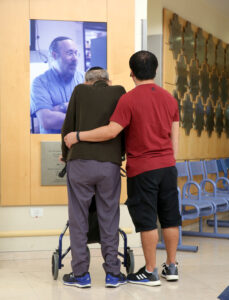This year marks the 20th Yahrzeit of Dr David Applebaum z”l. An incredible man who dedicated his life to healing and changed the path of emergency medicine. He pioneered the idea of immediate care clinics in Israel (Terem), to divert non-emergency cases from hospital emergency rooms and was considered ‘a master of emergency medicine’ by Professor Jonathan Halevy.
Early life
Born in Detroit, USA, Dr Applebaum displayed a passion for medicine from an early age. He was driven by a desire to alleviate suffering and make a difference in the lives of others. He pursued his dream by studying at the Wayne State University School of Medicine, graduating with honours.
In 1981, he moved to Israel and became a driving force in advancing emergency medical care. He played a pivotal role in establishing the Emergency Department at Shaare Zedek, serving as its director for many years. Under his guidance, the department flourished, saving countless lives and providing exceptional care to patients. Dr Applebaum gave his life to his work, he was on call 24hrs a day, 7 days a week, including Shabbat, when he would often walk to the hospital.
A cherished teacher
Dr Applebaum’s innovative approach to trauma care transformed emergency medicine in Israel. He introduced ground-breaking protocols and training programs that improved survival rates and raised the standard of trauma care to new heights.
Beyond his clinical work, Dr Applebaum was a cherished teacher and mentor to countless medical professionals. He inspired and nurtured a new generation of emergency physicians, instilling in them the values of compassion, dedication, and professionalism. Dr Applebaum believed in the power of medicine to bridge divides and bring people together. He actively promoted collaboration and cooperation between Israeli and Palestinian healthcare providers, fostering relationships that transcended political and cultural barriers.
Tragedy struck
On September 9, 2003, tragedy struck. On the eve of his daughter Naava’s wedding, Dr Applebaum and his daughter were killed in the most tragic of circumstances, the victims of a terrorist attack at Café Hillel in Jerusalem. As ambulances began delivering the wounded from the attack, the Director General of Shaare Zedek at the time Professor Halevy was nervous. He knew that Dr Appelbaum was usually the first to report to the hospital after a bombing and there was no sign of him.
“It was clear to me from very early on that David Appelbaum – when he didn’t show up and I knew he was in Jerusalem and he hadn’t called – that a terrible tragedy had occurred,” Halevy shared with Haaretz newspaper soon after the attack. “Confirmation of my suspicions came shortly.”
Word that he was one of the victims came from a rescue worker who recognized him at the scene. The hospital staff had to cope with their own grief as they treated the wounded.

Dr Applebaum’s murder was described by The Lancet as a tragic irony: This victim of a suicide bomber was himself an “emergency room doctor who treated victims of dozens of suicide bombings in Israel.” His untimely death, along with his daughter sent shockwaves through the whole medical community and the Shaare Zedek family.
Dr Applebaum’s life was an embodiment of selflessness, dedication, and unwavering commitment to healing. He left an indelible mark on the medical community in Israel and beyond and will never be forgotten.